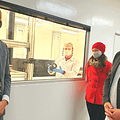LATEST NEWS
Cities can lead economic bounce back from COVID-19 impact
7 October 2021
BUSINESS BRIEF BY ALDERMAN JAMES VOS, THE CITY OF CAPE TOWN MAYORAL COMMITTEE MEMBER FOR ECONOMIC OPPORTUNITIES
A recent news article on Moneyweb shows how corruption and red tape have devastated South Africa’s manufacturing sector to the point where our economy is one of just 13 in the world producing less now than a decade ago. It is only the latest indicator of the urgent and tough actions we must take to set the country on a different path.
As South Africa’s vaccine rollout gains momentum and the prospect of a return to pre-pandemic times looks increasingly possible, there is cause for optimism that Cape Town can seize the moment in driving the economic agenda.
In Cape Town, we have not been resting on our laurels, and have taken the time to carefully revise our city’s economic strategy in response to the COVID-19 pandemic and related challenges.
If the issues that we sought to address could be likened to steep hills before 2020, they soon took on the appearance of Everest-high mountains with a pandemic that has marched on for more than 18 months.
Many businesses have been forced to the brink of financial ruin, while hundreds of thousands more people across the country were left jobless and destitute.
Cape Town has in some ways been able to mitigate the effects of these crises, thanks in large part to the foundations laid by good governance over the years.
Since 2018, the City secured R20,5bn in investments, creating over 21 500 jobs and 7600 training opportunities via our funded Strategic Business Partners (SBPs) in high-growth industries.
These SBPs help us to execute investment facilitation, job placement, training, productivity and market assess support in high-growth industries with low barriers to entry, especially for young people.
We are seeing the results with 50 000 now employed in tech, 60 000 in call centres, and promising projected growth for emerging industries like greentech, which is expected to be worth R135 billion in the next decade or so.
We are also making it easier for SMME’s to survive in tough pandemic times by paying 100% of City suppliers within 30 days, and by being accessible to help with the ease of doing business. Over 4800 enquiries from SMME’s were serviced via the City’s Business Hub. This is a key interface with SMMEs launched in August 2019, with 99% of service requests actioned within 2 working days in 2020/21.
With Workforce Development Programmes such as Jobs Connect, we aim to fulfil two distinct purposes: to link businesses and corporates to the appropriate talent, and to provide knowledge, training and employment opportunities to job seekers. Under this initiative, over 55 000 people have been registered and assessed, 15 087 trained in work readiness, and almost 5 400 people have been placed in jobs since December 2017.
It is through these platforms and initiatives that Cape Town has maintained its status as the metro with the lowest unemployment rate.
However, we have not been able to completely shield our communities from the impact of COVID-19 and the related lockdown. As is usually the case, it is the most vulnerable among us who have endured the biggest impact of this crisis.
It was thus my honour as Cape Town’s Mayoral Committee member for Economic Opportunities to lead officials from the various departments in formulating the new Inclusive Economic Growth Strategy and I welcome the City Council’s decision to approve it.
This robust action plan expands on our initiatives to boost business and employment prospects. It follows an unflinching analysis of Cape Town’s socio-economic climate within the South African context, and detailed input from business and industry stakeholders, academics, and members of the public.
It is thus both bold and far-reaching in its goals, yet meticulously plotted with nearly 200 deadline-driven steps that drill down into meeting the needs of industries such as construction, manufacturing and informal sectors while simultaneously tackling social issues that block access to opportunities for so many.
In the first and short-term phase, our focus will be on implementing measures that stabilise the economy and stem the economic downturn from COVID-19. Our aim will be to make it even easier to do business.
This will also mean stepping up our efforts to create a larger skilled workforce by supporting the ongoing development of integrated job search and work placement centres in communities and partnering with employment sourcing hubs to roll out job readiness workshops.
With this foundation in place, we will turn to promoting Cape Town as a prime investment destination, particularly for its high growth sectors such as call centres, the green economy, and information technology. In each of these sectors, Cape Town has gained a reputation as Africa’s hub for investment opportunities.
In the final step, our aim will be to sustain the progress made, and particularly our ability to adapt to pandemic-like crises.
City assets and infrastructure such as Wi-Fi and our Investment Facilitation Services will be leveraged throughout, as it has to great success in recent years.
Key to this strategy is the principle of inclusivity. A society cannot realise its full potential if it does not make its opportunities accessible to all its people.
The ingenuity and determination of people all across this city – like the tour guides in Khayelitsha, the boat-builders in Woodstock, and the Diep River call centre operators speaking to clients in London – has made clear that the passion for growth exists, it simply needs to be unlocked.
Let’s get it done.
You can find the full strategy here with chapters broken down by problem statement (where the issues hampering economic growth are interrogated), the efficient use of City services, labour market support, and business retention and expansion.









